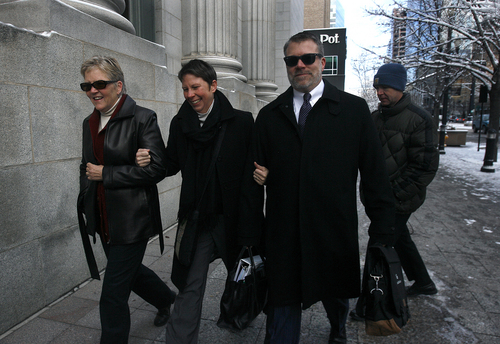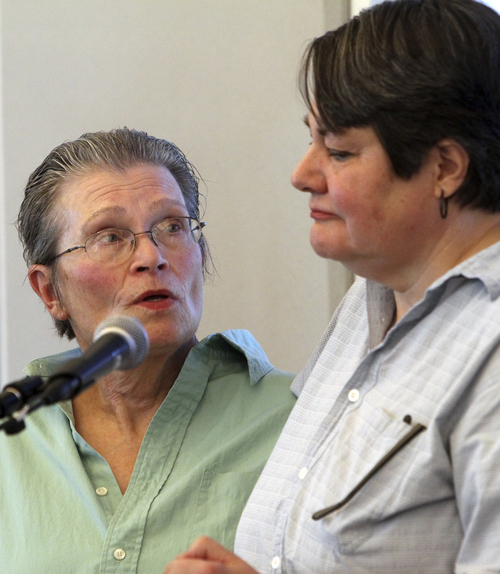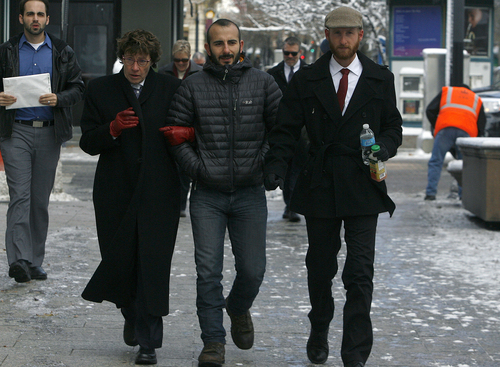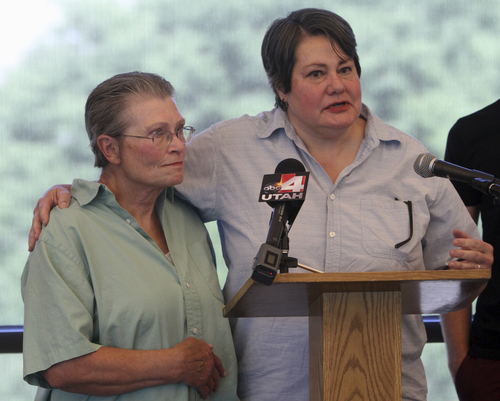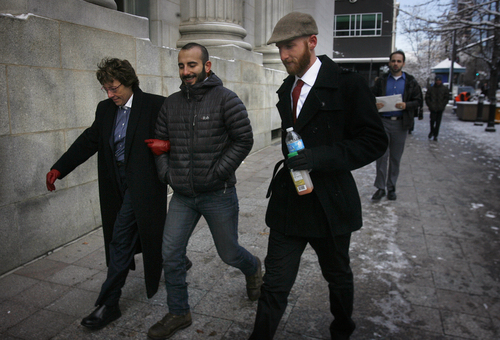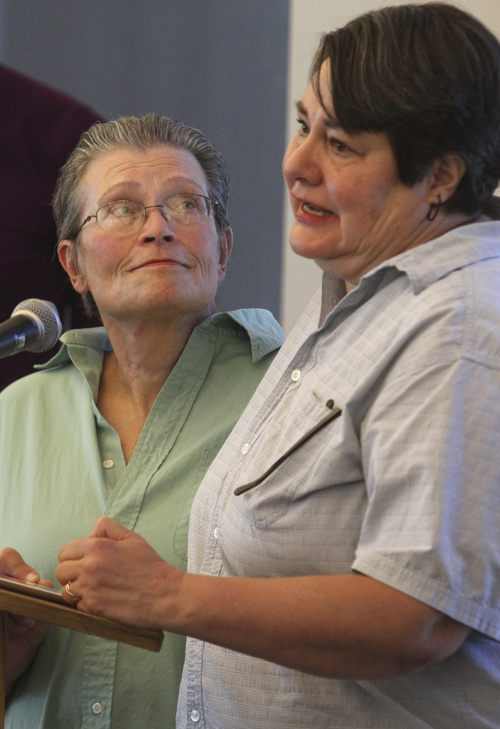This is an archived article that was published on sltrib.com in 2014, and information in the article may be outdated. It is provided only for personal research purposes and may not be reprinted.
Attorneys representing three couples say in a new brief that Utah laws prohibiting same-sex marriage have "cemented discrimination against same-sex couples and their children into the state's most basic charter," denying those families not only the protections that flow from civil marriage but also the "common vocabulary of family life and belonging" that other Utahns may take for granted.
In a 118-page response filed late Tuesday evening with the 10th Circuit Court of Appeals, the attorneys argue Utah's 2004 constitutional amendment barring same-sex marriages and recognition of marriage or other legal unions performed elsewhere stigmatizes the couples' relationships, leaving them with "no way to publicly express or formalize their commitment to one another" or assume duties and responsibilities of shared lives.
Nearly every aspect of the couples' lives is touched by the exclusion, from their ability to access state and federal benefits to being able to care for one another in times of illness and crisis, the attorneys said.
"No matter how deeply they care for one another or how long they have stood by one another, for better or worse, in sickness and in health, Amendment 3 treats plaintiffs and other same-sex couples as legal strangers to one another," the brief states.
The ban tells them that "they are not, and never can be, true families," the attorneys wrote.
The brief was filed on behalf of three couples who challenged Utah's ban on same-sex marriage. Those couples are Derek Kitchen and Moudi Sbeity; Kate Call and Karen Archer; and Kody Partridge and Laurie Wood. U.S. District Court Judge Robert J. Shelby ruled in their favor Dec. 20, finding Utah's ban on same-sex marriage is unconstitutional.
The state appealed. In its opening brief filed Feb. 3, state attorneys based their defense of Amendment 3 on claims they said were grounded in the long-term interests of children. The state said the ban on same-sex marriage protects a "child-centered institution" that promotes Utah's interest in encouraging stable families and responsible procreation.
More than two dozen individuals or groups, including The Church of Jesus Christ of Latter-day Saints and 81 Republican Utah lawmakers, filed amicus briefs in support of the state's position.
Amicus briefs backing the couples' position will be filed over the next week. The state also has until March 4 to file its final response. The 10th Circuit Court will hear oral arguments in the case April 10.
The three couples are being represented by attorneys Peggy A. Tomsic, James Magleby, Jennifer Fraser Parrish as well as Kate Kendall, Shannon P. Minter and David C. Codell from the National Center for Lesbian Rights.
"This case is about one of our Constitution's most basic principles — the requirement of equality under the law," Tomsic said in a statement. "The couples in this case are upstanding, responsible members of the Salt Lake City community who simply wish to have the same ability to protect their families as other Utah citizens. The law should not treat people differently simply because of who they are."
In their brief, the couples' attorneys said Utah's law has the same effect as the federal Defense of Marriage Act struck down last summer by the U.S. Supreme Court: it places same-sex couples and their families in a separate and unequal status.
The state claims that treating same-sex couples' families equally might lessen interest of opposite-sex couples in marrying and having children, an argument the attorneys said was expressly rejected by the Supreme Court in its DOMA ruling in favor of the need to protect "existing families and existing children."
"The court struck down DOMA because that statute burdened, 'in visible and public ways,' same-sex couples' personal, private and constitutionally protected choices to marry," the brief states.
The decision also made clear that when weighing whether a law disadvantages same-sex couples, courts may not "blindly defer to hypothetical justifications" offered by a state but must consider the purpose underlying the law and the actual harm it causes.
Under any level of constitutional scrutiny, Amendment 3 fails that test, the attorneys said.
In 2004, Utah became one of the first states to adopt a same-sex marriage ban. At the time, gay and lesbian persons were portrayed in a negative light in highly charged political campaigns, the brief states. Proponents of the measure, which was approved by 66 percent of the registered voters who participated in the election that year, said among other things that the amendment was needed to avoid blowing "out the moral lights around us."
"The legislative record and the circumstances surrounding the enactment of Utah's exclusionary marriage provisions — as well as the laws' plain language and stated intent to prevent same-sex couples from gaining access to marriage or any other type of family protections — demonstrate that their purpose and effect are to impose inequality on same-sex couples and their families," the attorneys argue.
Every court that has considered such bans following last summer's decision in the DOMA case has concluded the laws are unconstitutional, they point out. Those states include Utah, Ohio, Oklahoma, Kentucky and Virginia.
On Wednesday, a federal judge in Texas declared that state's ban on gay marriage was unconstitutional, but left it in place until an appeals court can rule on the case.
"Full citizenship and limited government — on which our democracy rests — are impossible when fundamental rights such as the freedom to marry are arbitrarily denied to one group of people," the brief states.
And excluding same-sex couples from marriage neither furthers a legitimate government interest nor is there a rational connection between such a ban and a state interest in procreation or parenting, the attorneys said.
The plaintiffs — among them a retired physician, a university professor, small business owners and a middle school teacher — are not seeking a new right, but rather to make the same "legally binding commitment to one another and to join their lives in a way" that opposite-sex couples do and that must be "respected by the government and third parties."
As with any fundamental right, the "freedom to marry is defined by the substance of the right itself, not the identity of the person asserting it — let alone the identity of the persons who have historically been denied it," the brief states.
Yet the state argues "formalistically" that because same-sex couples never have been granted marriage licenses, they should not get them now, the attorneys said.
States that defended marriage restrictions in the past "all believed that there were valid reasons for them — as did the majority of voters at the time. That did not stop the Supreme Court from invalidating them under the Constitution," the attorneys said.
The brief lambastes the state's claim that its defense of Amendment 3 is based on a "child-centric" view of marriage, saying that denigrates the "interests of adults" in choosing whether and whom to marry — an interest the Supreme Court has held are central to individual autonomy under the Fourteenth Amendment, the attorneys said.
"Marriage is not a zero-sum game that pits the needs of children against the desires of adults," the attorneys said. "To the contrary, marriage benefits the health and wellbeing of both adults and children in numerous ways, as the nation's leading mental health organizations have emphasized."
And children of both same-sex and opposite-sex couples "benefit to the same degree, and in the same ways, from having parents who are married."
In fact, they said, excluding same-sex couples from marriage "would seem to undermine the child-centric view, because that exclusion fences out one segment of society and tells them that getting married and having children is not a life path that is open to them."
The attorneys said a host of national organizations have concluded that children raised by same-sex parents are as well adjusted as children raised by opposite sex parents, refuting many of the experts and studies cited by the state.
But marriage is not only about raising children, they argue. It's about sharing the joys and sorrows of life and remaining companions long after children are grown.
And the ban subjects only same-sex couples to a requirement of "natural procreative ability" that is not imposed on opposite-sex couples, whether they are infertile, elderly or simply do not want children.
The "illegitimacy" of the state's asserted interest is revealed by the fact it does not penalize any other class of "non-optimal" parents, such as drug addicts or individuals convicted of abusing or molesting children, by prohibiting them from marrying.
The attorneys said the state's assertion that redefining marriage would be a "recipe for social and religious strife" is "deeply offensive" and "repugnant to our constitutional tradition."
"Constitutional rights would be hollow indeed if courts were precluded from upholding them when some part of the population might be upset," they said.
The attorneys said the state has not shown how allowing same-sex couples to marry would negatively affect religious beliefs about the institution. "The courts are available to remedy them" if infringements of religious liberty occur, they said.
The attorneys said Utah's "anti-recognition law" is especially harmful to same-sex couples such as Archer and Call who have valid marriages issued by other states. Failure to recognize those marriages is contrary to a "firmly rooted doctrine" that allows married couples to reasonably expect to travel throughout the country and know that "the simple act of crossing a state line will not divest them of their marital status."
That "place of celebration" rule has existed in Utah for nearly a century and even allowed the state to recognize interracial marriages performed elsewhere when they still were prohibited by the state, they said.
Twitter: @Brooke4Trib —
New poll on LGBT acceptance
A new national survey reveals growing acceptance of same-sex marriage and other LGBT issues across all religious, political and age groups. The same poll also shows that most Americans see three major religious groups — the Catholic Church, Mormon church and evangelical Christian churches — as "unfriendly" toward gay people. See the story at sltrib.com.


